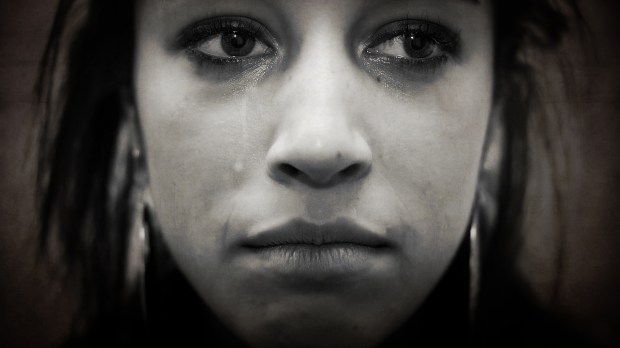There was a sinful woman in the city who learned that he was at table in the house of the Pharisee. Bringing an alabaster flask of ointment, she stood behind him at his feet weeping and began to bathe his feet with her tears.
Then she wiped them with her hair, kissed them, and anointed them with the ointment.
—Luke 7:37-38
What was it that prompted the unnamed woman to break social convention and approach Jesus, doing something as intimate as washing his feet (with her tears and hair, no less), kissing them, and anointing them with expensive ointment?
Saint Luke, who makes those on the fringes of society a special focus of his gospel, doesn’t give the woman a name, although her identity is clear: “a woman in the city, who was a sinner.” For Simon “the Pharisee” and the other guests at that dinner, who the woman was mattered nothing compared to what she was—a sinner. Her act not only brought on the derision of the dinner guests—“Who is this woman who would dare touch this man?”—but also placed Jesus in the position of having to defend her and his own willingness to receive and forgive her: “If this man were a prophet, he would know who and what sort of woman this is who is touching him.”
Jesus’ response to Simon’s indictment of the woman is important. First, it reminds us that the scope of God’s mercy transcends any sort of restrictions we might place upon our own willingness to forgive. Second, it places before us our tendency to become anxious, nervous, worrying people who are, as Henri Nouwen wrote, “caught in the questions of survival: our own survival, the survival of our church, our country, and our world. Once these fearful survival questions become the guiding questions of our lives, we tend to dismiss words spoken from the house of love as unrealistic, romantic, sentimental, pious, or just useless” (from Jesus: A Gospel). Undoubtedly, Simon and many of those dinner guests had heard Jesus preach love and forgiveness. The presence and actions of that woman, in that moment, seem to have undone whatever expansion and openness that might have taken place in the Pharisee’s heart.
Sirach reminds us that “to the penitent [God] provides a way back, he encourages those who are losing hope!” (17:19). We can imagine that the sinful woman understood these truths, and Jesus doesn’t deny that she is a sinner. And yet, he doesn’t reduce her to her sin or seek to label her. She acted as she did out of love and ultimately found what she was seeking—a love that would allow her to love even more.
The labels that we have for others—labels that are based on difference, fear, anxiety, and our own desire for constancy and security—all too often deny the basic goodness and humanity in the one we are making an “other.” And we, as Church people, are often among the first to use labels, particularly for those whose theological/ecclesiological/philosophical/political outlook differs from ours. But, as an ancient Syrian preacher observed, “A sinful woman has proclaimed to us that God’s love has gone forth in search of sinners.” This is the Good News to which we are dedicated: mercy and grace which are God’s prerogative. No strings are attached.
Too often, like Simon, we waste wonderful opportunities by expending our energy trying to protect what we love (e.g. our selves, our families, our Church, our homeland) from those we believe are a threat to our comfort and security. But, Simon’s great fault was the he forgot that he, too, was in need of forgiveness and that it is Jesus who forgives sins. Where Simon’s perspective failed him, we are given an opportunity to live in humility: yes, the woman was a sinner, but so are we. Just as God knew her for who she was—by name and as a beloved daughter—God sees us in the same way and offers us the same mercy, grace, and love.
When have you been reduced to a sin or to past mistake in someone else’s mind? How did this feel?
How have you experienced Christ’s forgiving love?
How does the love of the sinful woman inspire you show love? How are you being called to show mercy to others?

